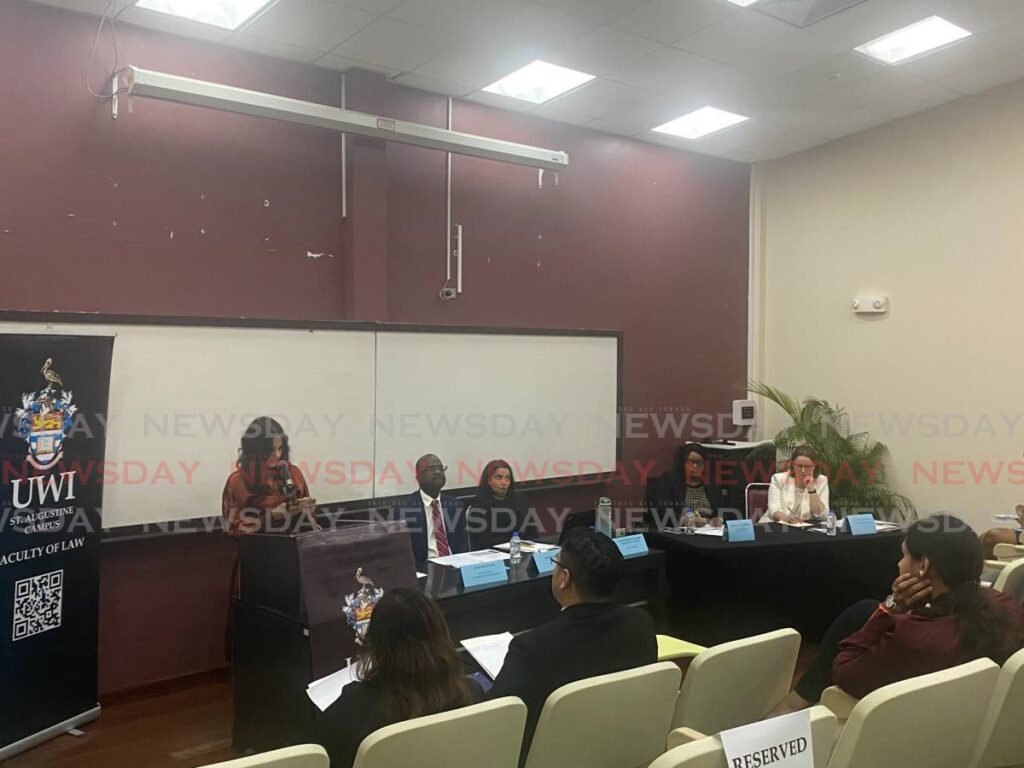UWI human rights panel: UN still relevant but needs work

THE general consensus of a UWI-hosted panel on human rights on Monday was that while the UN remains relevant in today's society, it is in dire need of revamping.
The panel discussion, titled 75th Anniversary of the Declaration of Human Rights: Reaching Substantive Equality and Reframing Narratives, was held at the Noor Hassanali auditorium at UWI, St Augustine.
Dean of the campus's Faculty of Law Dr Alicia Elias-Roberts said the topic was an important one for both organisations, calling the declaration a "groundbreaking document that advocates for the universal protection of fundamental human rights."
She spoke on behalf of campus principal Prof Rose-Marie Belle Antoine.
She said the declaration acknowledges that every individual is born equal and free, regardless of nationality, gender or ethnicity.
"This declaration has been translated into law numerous times, whether domestic, regional or international (and) paved the way for many treaties.
But she added that the world has a "unique set of challenges," and as much as there has been progress with respect to the declaration, "There continues to be rampant discrimination, inequality, conflict, xenophobia..."
Still, she commended the UN for its commitment in spite of the challenges it now faces.
UN resident co-ordinator Joanna Kazana said the declaration is one of the UN's "highest accomplishments," as it has been a roadmap to equality.
She admitted it has not always been followed and upheld, but praised TT for sticking to it.
"The time for human rights is now. I believe it's a great opportunity for all of us to, yet again, recommit ourselves to the principles articulated in the declaration.
"Let's build on the legacy of the people who crafted this (declaration)."
Executive director of the Caribbean Centre for Human Rights Denise Pitcher believes the world is observing a "steady erosion" of the declaration, which she added, "gave birth to several conventions, treaties and interventions.
"It seems the human rights systems is facing an existential crisis today," she said.
She added that while it does a lot of good, social media can also cause harm, as it can be used as a vehicle against freedom of speech and enabler of propaganda.
Eden Charles, former ambassador for TT to the UN in New York, said some countries have incorporated the declaration into their domestic laws, but others consider it "just a statement of ideals with no binding provisions."
He believes it has achieved formal equality, but warned that this does not guarantee equal outcomes.
When it comes to people with disabilities, he recalled when Equal Opportunity Commission (EOC) chairman Ian Roach, who used a wheelchair, was appointed a senator. Roach was also present.
Charles said "last-minute arrangements" were made to accommodate Roach in the Chamber.
"That pained me because I sat at the UN, led the TT delegation to adopt the Convention on the Rights of Persons with Disabilities, and sadly or woefully, TT has not adopted the political will to implement the provisions of that treaty."
He urged students in the audience to continue to be human-rights advocates.
High Court judge Justice Nalini Singh said there are challenges to the full realisation of human rights, especially as there are still laws which discriminate against others based on gender, sexual orientation, etc.
She urged that the declaration be used to guide and inspire moral conduct in modern societies.
During the question-and-answer segment, a student asked the panel how countries can combat the deficiencies within the UN, adding that it is a system whose member countries seem to break those very rules.
Charles said he understands why the UN may not seem "fit for purpose...
"The UN has to be reformed, but I still believe the world is better off with (it)."
He said the UN is more than just the security council.
"The UN is also the ICJ (International Court of Justice), UNEP (UN Environment Programme), UNESCO (UN Educational, Scientific and Cultural Organization)...I believe we need to continue to advocate to make it better."
EOC chairman Roach agreed with Charles, saying there cannot be continued "transgressions by the five permanent members (of the UN) to veto and do as they please with no sanctions at all, and when the rest of them are called to account, there are severe consequences."
Kazana said all the points made about the UN were valid, but added that it is currently "under tremendous pressure to deliver solutions.
"At the same time, it is an organisation that is paralysed by the way it was conceived..."
She said it will continue to develop and progress as new challenges arise.

Comments
"UWI human rights panel: UN still relevant but needs work"